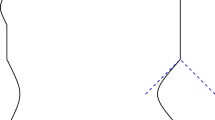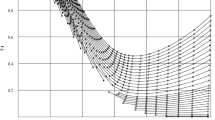Abstract
This paper attempts to analyze the concept of quantum statistical determinism. This is done after we have clarified the epistemic difference between causality and determinism and discussed the content of classical forms of determinism—mechanical and dynamical. Quantum statistical determinism transcends the classical forms, for it expresses the multiple potentialities of quantum systems. The whole argument is consistent with a statistical interpretation of quantum mechanics.
Similar content being viewed by others
References and notes
SeeElectrons et Photons, Rapports et Discussions du Cinquième Conseil de Physique (Solvay, 1927) (Gauthier-Villars, Paris 1928). The volume contains a reproduction of the Conference of Bohr at Como (September 16, 1927).
For a further analysis, see E. Bitsakis,Le problème du déterminisme en physique, Thèse d'Etat, Paris, 1976.
See (1) N. Bohr,Atomic Physics and Human Knowledge (Wiley, New York, 1958);Atomic Theory and the Description of Nature (Cambridge University Press, Cambridge, 1961);Essays 1958–1962, on Atomic Physics and Human Knowledge, (Richard Clay, Suffolk, 1963);
(2) W. Heisenberg,Physics and Philosophy (Allen and Unwin, London, 1958);
(3) J. von Neumann,Mathematical Foundations of Quantum Mechanics (Princeton University Press, Princeton, 1955).
(4) M. Jammer,The Philosophy of Quantum Mechanics (Wiley, New York, 1974);
(5) W. Pauli, ed.,Niels Bohr and the Development of Physics (Pergamon Press, New York, 1955).
See E. Mach,The Analysis of Sensations (Dover, New York, 1959).
See (1) D. Hume,Inquiries Concerning Human Understanding, (Clarendon Press, Oxford, 1963);A Treatise of Human Nature (Clarendon Press, Oxford, 1960.
(2) G. Berkeley,Three Dialogues (Open Court, La Salle, Illinois, 1954);Principle of Human Knowledge (Open Court, La Salle, Illinois, 1950).
D. Hume,Inquiries Concerning Human Understanding, op. cit., p. 119.
D. Hume,A Treatise of Human Nature, op. cit., p. 77.
E. Mach,The Analysis of Sensations (Dover, New York, 1959), p. 367.
See H. Poincaré,La valeur de la science (Flammarion, Paris, 1945);Science et Méthode (Flammarion, Paris, 1942).
R. Carnap,Philosophy and Logical Syntax (Egnatia, Athens, (bilingual edition), p. 48.
See R. Carnap,Les fondements philosophiques de la physique (A. Colin, Paris, 1973), pp. 211, 275, and 278.
L. Wittgenstein,Tractatus Logica-Philosophicus (Routledge and Kegan Paul, London, 1963), 5.1361, 6.32.
E. Cassirer,Determinism and Indeterminism in Modern Physics (Yale University Press, New Haven, 1956), pp. 5 and 58.
Aristotle,Metaphysics, 1063 a–b.
For the principle of economy, the history of variational principles, and more generally the ideas concerning the development of the science of mechanics, see W. Yourgrau and S. Mandelstam,Variational Principles in Dynamics and Quantum Theory (Pitman, London, 1960).
I. Newton,Principia (University of California Press, Los Angeles, 1947), p. 398.
Laplace,Oeuvres complètes (Gauthier-Villars, Paris, 1878), Vol. 7, p. 6.
See N. S. Kronfli,Int. J. Theor. Phys. 4, 141 (1971).
See S. P. Gudder,J. Math. Phys. 11, 1037 (1970).
F. Bopp, inObservation and Interpretation, S. Körner, ed. (Butterworths, London, 1957).
M. Born,Phys. Bl. 11, 49, 304 (1955).
M. Born,J. Phys. Radium 20, 43 (1959).
For a detailed analysis, see E. Bitsakis,Physique et Matérialisme (Ed. Sociales, Paris, 1983).
Aristotle,Physics, 22a. See also: (1) A. Einsteinet al., The Principle of Relativity (Dover, New York, 1923);
J. R. Lucas,A Treatise of Time and Space (Methuen, London, 1976).
See E. Bitsakis, inDeterminism in Physics, E. Bitsakis and N. Tambakis, eds. (Gutenberg, Athens, 1985).
Quoted from J. M. Jauch,Foundations of Quantum Mechanics (Adisson-Wesley, New York, 1968).
See J. von Neumann,Mathematical Foundations of Quantum Mechanics, op. cit.
E. Wigner,Am. J. Phys. 31, 6(1963).
For the Schrödinger paradox, see: (1) E. Bitsakis,Ann. Fond. L. de Broglie 5, 263 (1980);
A. Peres,Found. Phys. 14, 1131 (1984). For an argumentation against the single-system interpretation, see E. J. Post, “A hidden proposition of the Copenhagen School,” preprint, and E. Bitsakis,Le Problème du déterminisme en Physique contemporaine, op. cit. Post writes: “The major unproven proposition in the Copenhagen chain of deductions is, from the point of view presented here, the silent choice of giving Schrödinger's equation a single-system status, and then to extend this status also to the Heisenberg approach.”
E. Wigner,Am. J. Phys. 31, 6 (1963).
See (1) N. Gisin and C. Piron,Lett. Math. Phys. 5, 379 (1981);
E. Bitsakis, inMicrophysical Reality and Quantum Formalism, A. van der Merwe, F. Selleri, and G. Tarozzi, eds. (Reidel,Dordrecht, 1988);Le problème du déterminisme en Physique contemporaine, op. cit.
L. de Broglie,La physique quantique restera-t-elle indéterministe? (Gauthier-Villars, Paris, 1953), p. 32.
E. Schrödinger, inLouis de Broglie, physicien et penseur (Albin Michel, Paris, 1952), p. 20.
E. Schrödinger,ibid. in
See the thought experiment of Einstein inElectrons et Photons, op. cit., and inAlbert Einstein, Philosopher and Scientist, A. Schilpp, ed. (Open Court, La Salle, Illinois, 1951).
N. Gisin and C. Piron,Lett. Math. Phys. 5, 279 (1981); see also F. Fer,Irréversibilité (Gauthier-Villars, Paris, 1977) and Th. Vogel,Ann. Fond. L. de Broglie 2, 217 (1977).
Aristotle,Physics, 207b.
E. Wigner,Am. J. Phys. 31, 6 (1963).
See, for example, V. Fock,Dialectica 19, 223 (1965), and Y. Satchkof,La Philosophie et les conceptions du monde, dans les sciences modernes (Acad. Sc. URSS, Moscow, 1978).
H. Margenau,Physics and Philosophy (Reidel, Dordrecht, 1978), p. 36.
See E. Bitsakis, inOpen Questions in Quantum Mechanics, G. Tarozzi and A. van der Merwe, eds. (Reidel, Dordrecht, 1983).
Author information
Authors and Affiliations
Rights and permissions
About this article
Cite this article
Bitsakis, E. Quantum statistical determinism. Found Phys 18, 331–355 (1988). https://doi.org/10.1007/BF01891495
Received:
Issue Date:
DOI: https://doi.org/10.1007/BF01891495




